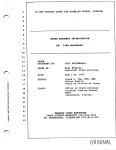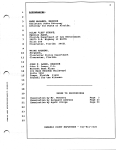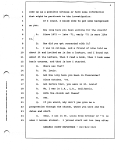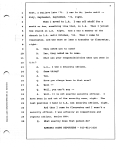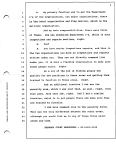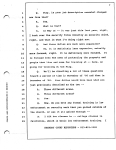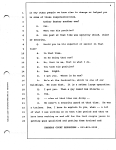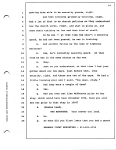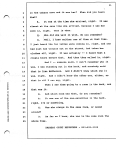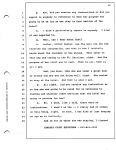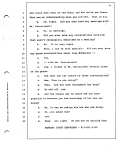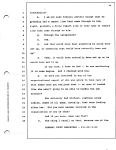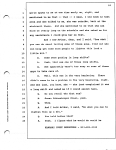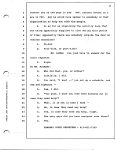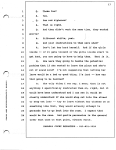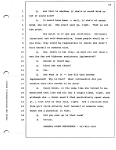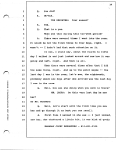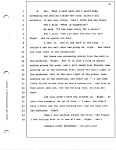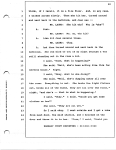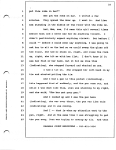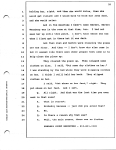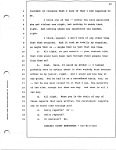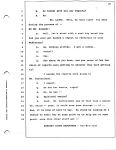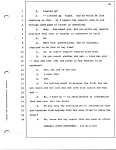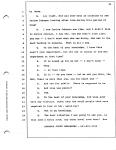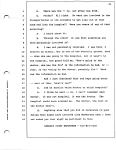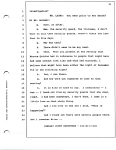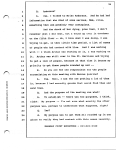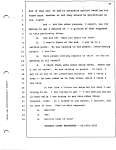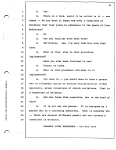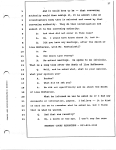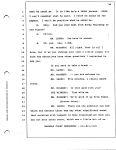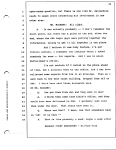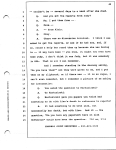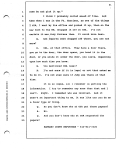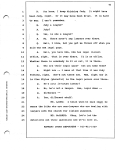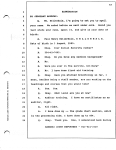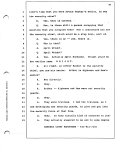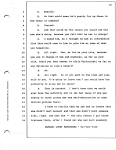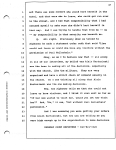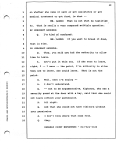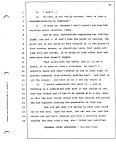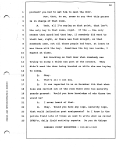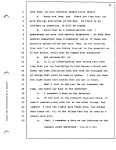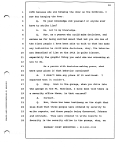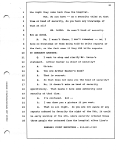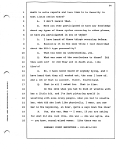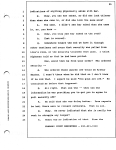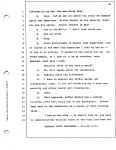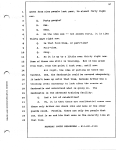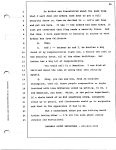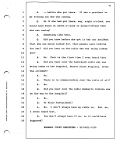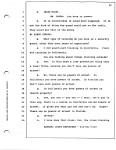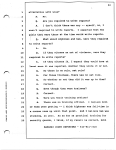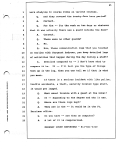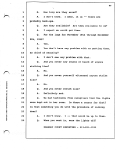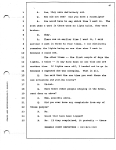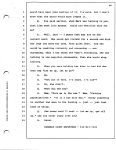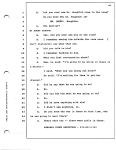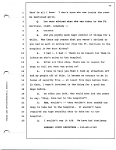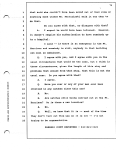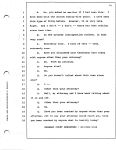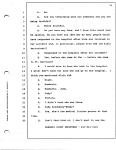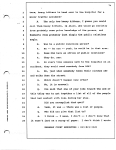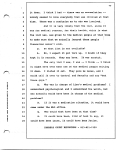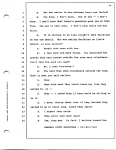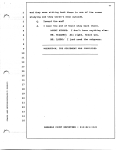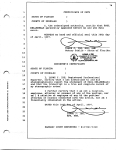Sworn Statement of Paul Kellerhals
| Date: | April 30, 1997 |
| Pages: | 78 |
IN THE CIRCUIT COURT FOR PINELLAS COUNTY, FLORIDA
STATE ATTORNEY INVESTIGATION
RE: LISA McPHERSON
SWORN
STATEMENT OF: PAUL KELLERHALS.
TAKEN BY: Mark McGarry,
Assistant State Attorney.
DATE: April 30, 1997.
BEFORE: Lynne J. Ide, RPR, RNR
Notary Public,
State of Florida at Large.
PLACE: Office of State Attorney
Criminal Justice Center
B200
Clearwater, Florida.
KANABAY COURT REPORTERS
TAMPA AIRPORT MARRIOTT (813)224-9500
ST. PETERSBURG, CLEARWATER (813)821-3320
page 2
APPEARANCES: MARK McGARRY, ESQUIRE Assistant State Attorney Attorney for State of Florida. ALLAN "LEE" STROPE, Special Agent, Florida Department of Law Enforcement 28870 U.S. Highway 19 North Suite 200 Clearwater, Florida 34621 WAYNE ANDREWS, Sergeant, Clearwater Police Department Clearwater, Florida. JOHN F. LAURO, ESQUIRE John F. Lauro, P.A. Barnett Bank Plaza 101 East Kennedy Boulevard Suite 3950 Tampa, Florida 33602 Counsel for the Witness. INDEX TO PROCEEDINGS Examination by Mr. McGarry Page 3 Examination by Sergeant Andrews Page 43 Examination by Agent Strope Page 59
page 3
(Witness sworn).
MR. LAURO: My name is John Lauro and I represent Mr. Kellerhals. Mr. Kellerhals is testifying today pursuant to subpoena that has been issued by the State Attorney's Office in Pinellas1County. He would have not testified but for the issuance of this subpoena and would have asserted his constitutional rights. As a result of the issuance of the subpoena, he's protected under the provisions of Florida law which grant a witness such as him all of the protections of testimonial immunity as result of the issuance of the subpoena. With that understanding, he's prepared to testify today.
MR. McGARRY: All right.
PAUL KELLERHALS, the witness herein, being first duly sworn, was examined and testified as follows:
EXAMINATION BY MR. NcGARRY:
Q. My name is Mark McGarry. I'm a prosecutor. We are conducting an investigation into the circumstances surrounding the death of Lisa McPherson. Your name has
page 4
come up as a possible witness or have some information that might be pertinent to the investigation. If I could, I would like to get some background on you. - How long have you been working for the church?
A. Since 1972 -- late 71, early 72 is more like it.
Q. How did you get connected with it?
A. I was in college, and a friend of mine told me about it and invited me in for a lecture, and I found out about it via lecture, then I read a book, then I took some basic courses, and that is how I started.
Q. Where was that?
A. St. Louis.
Q. And how long have you been in Clearwater?
A. Since October, 93.
Q. And before that, you were in St. Louis?
A. No, I was in L.A., L.A., California.
Q. With the church out there?
A. Yes.
Q. If you would, why don't you give me a progression through the church, where you were and the dates and stuff.
A. Okay, I was in St. Louis from October of 71 is when I became student. I joined staff not too long after
page 5
that,. I believe late 71. I was in St. Louis until -- July, September, September, 73, right. Then I moved to L.A. I was off staff for a month or two, something like that, in L.A. Then I joined the church in L.A. Right. And I was a member of the church in L.A. until October, 93. Then I came to Clearwater, and was more or less a transfer to Clearwater, right.
Q. They asked you to come?
A. Yes, they asked me to come.
Q. What was your responsibilities when you were in L.A.?
A. L.A., I was a security officer.
Q. Same thing?
A. Yes.
Q. Have you always been in that area?
A. Well --
Q. Well, you can't say --
A. Well, it is not exactly security officer. I have been in and out of the security area, right. The last position I held in L.A. was security officer, right. And then I came to Clearwater and I wasn't a security officer, I was actually an inspections and reports officer, Senior HCO.
Q. What exactly does that person do?
page 6
A. My primary function was to get the. Department 3's of the organizations, two major organizations, there is the hotel organization and Flag Service, which is the delivery organization. And my main responsibilities, there were three of these..One was establish department 3's, which is your inspections and reports sections, right.
Q. Yes?
A. You have senior inspections reports, and then in the two organizations you have an inspections and reports officer under you.. They are not directly command line under you, it is more a flanking organization to make sure these people exist. Right. So a lot of the job is finding people who qualify for the positions in these areas and getting them trained to function in those areas. Right. And an additional function I had was the security area, which I was over that, as well, right, from that post, from that job, right. And I had a similar function, which is to put people there and make sure they are trained to function. I did have command line to the security force. That was the only difference between the other areas, although you could find me in any of these three major areas any time.
page 7
Q. Okay, is your job description somewhat changed now from that?
A. Yes.
Q. What is that?
A. In May of -- it was just this last year, right, I took over the security force directly as security chief, right, and that is what I'm doing right now.
Q. And those duties are much more expansive?
A. No, it is definitely less expansive, actually more focused, right. It is definitely more focused. It is focused into the area of protecting the property and people that live and come for training at -- here, so going for training at the Flag.
Q. We'll be directing a lot of these questions toward a period of time in November of 95 and then in December of 95. Your duties would have been what you just previously described as the two --
A. Three different areas.
Q. Three different areas?
A. Yes.
Q. Now, do you have any formal training in law enforcement or security work that you gained outside of the church, or was it all gained through --
A. I did two classes in -- college classes in California, which is basic law enforcement training. I
page 8
did that out of my own interest, right.
Q. Any training through any law enforcement department?
A. Well, that was -- the people who gave me the training were law enforcement officers, right.
Q. For those classes?
A. Yes, for those classes. And, I mean, I have had first aid training, I have had firefighter training. It is pretty general.
Q. So you have only had one employer since 1972, technically?
A. Essentially. I mean, there are different corporations in the church I work for.
Q. But all are underneath the main --
A. Right.
Q. -- main church?
A. I actually painted some houses in L.A. a while there, in there, too, for a while, so it is not strictly one employer. I was outside for a little while.
Q. All right. So during -- we are going to step into November of 95. You were one of the people in charge of the security at the Flag building, right?
A. Uh-huh.
Q. And let me run of f some names and you can fill
page 9
in any other people we know also in charge or helped you in some of those responsibilities. Arthur Baxter another one?
A. Yes.
Q. What was his position?
A. His post at that time was security chief, chief of security.
Q. Would you be his superior or senior in that time?
A. In that time.
Q. Is he doing that now?
A. No, that is me, that is what I do.
Q. You took his position?
A. Yes. Right. Q I got you. Where is he now?
A. He's at the Sandcastle, which is one of our buildings. He runs that. It is a rather large operation.
Q. I got you. Then a guy named Sam Ghiarna --
A. Yes.
Q. -- also at that time was doing --
A. He wasn't a security guard at that time. He was a trainee. See, I have to explain to you, when -- a lot of what I was working on at that time period and what we have been working on and off for the last couple years is getting guys qualified and getting them trained and
page 10
getting them able to be security guards, right. And that involves primarily training, right. And a lot of that is on church policies so they understand how the church works, right, and what is going on, and some basic training on law and that kind of stuff. So he was -- at that time Sam wasn't a security guard, he had not been posted, he was in training.
Q. And another fellow by the name of Alphonso Barcenas?
A. Yes, he's currently security guard. At that time he was in the same status as Sam was.
Q. Okay.
A. Just so you understand, at that time I had just gotten about six new guys, just before that, into security, right, and these are two of the guys. We had a little training pool and I said, "You guys, study."
Q. And they were a couple of them?
A. Yes.
Q. Had you ever met Lisa McPherson prior to her stay, which would have been November 18th, have you ever met her prior to that stay in 1995?
A. (Shakes head). THE REPORTER: Your answer out loud.
A. No.
Q. So when did you first learn that you had a guest
page 11
in the cabana area and it was her? When did you learn that?
A. It was at the time she arrived, right. It was almost at the same time she arrived, because I saw her walk in, right. That is when.
Q. Who did she walk in with, do you remember?
A. Well, I knew neither one of them at that time I just heard the two ladies were coming in, right, and one had just had trouble out on the street, had taken her clothes off, right. It was actually -- I. heard that a couple hours before that. And then they walked in, right. And I -- someone said, I can't remember who it was, I was standing out in the back, and somebody said that is Lisa McPherson. And I didn't know which one it was, right. And I didn't know the other one, either, so that is all I can say, right. Then I saw them going to a room in the back, and that was it.
Q. And which room was that, do you remember?
A. It was one of the one-seventies in the back, right, 172 or something.
Q. Was she always in the same room, or moved around?
A. As far as I knew, she was in the same room the whole time.
page 12
Q. Now, did you receive any instructions or did you report to anybody in reference to what her purpose was going to be as far as her stay in that section of the hotel?
A. I didn't particularly report to anybody. I kind of was reported to.
Q. Well, can I hear about that?
A. Arthur, Arthur Baxter, was the main one who had received the information, and that is how I initially heard about the incident in the street. Then later on that she was coming to the Ft. Harrison, right. And the purpose of her visit was to rest. That is all, that is all I got.. And, you know, like she was under a great deal of stress and she was not, doing well, right. She wanted to stay at the hotel. And that is what I got;
Q. All right. Did you receive any instruction as to how she was going to be cared for in reference to feeding and whatever other services that the hotel was going to provide for her?
A. No. I mean, like I said, there were no instructions. I wasn't on the -- I really had no orders on this thing, right. In fact, I was kind of just keeping an eye on it initially. And as far as where she was staying, I figured
page 13
she would just stay at the hotel and she would eat there. That was my understanding when she arrived. That is all.
Q. All right. Did you ever have any meetings with Mr. Kartuzinski?
A. No, no meetings.
Q. Did you ever have any conversations with him that wasn't necessarily described as a meeting?
A. No. It is very vague.
Q. Well, I can be more specific. Did you ever have any phone conversations about Lisa McPherson --
A. Yes.
Q. -- with Mr. Kartuzinski?
A. Yes, I talked to Mr. Kartuzinski several times on the phone.
Q. And what was the nature of those conversations?
A. Mmm, "How is she doing?"
Q. Okay. And was that throughout her stay?
A. On and off, yes.
Q. And the reason why he would ask you that question is because you had knowledge of how she was doing?
A. No, it was me asking him how she was doing.
Q. Oh, you asked him?
A. Yes.
Q. Okay. All right. So how was he gaining that
page 14
information?
A. , I am not even totally certain except that he probably had a report line that came through to him, right, probably a daily report line or some type of report line that came through to him.
Q. Through the caregivers?
A. Yes.
Q. And that would have been something he would have set up, or something that would have naturally been set up?
A. Yeah, it would have naturally been set up or he would have set it up. In any case, I knew he had -- he was monitoring it to some degree. And I checked with him.
Q. So were you involved in any of the organizational aspect of who was going to take care of this woman once you realized that -- or once it looked like she wasn't going to be able to handle the job herself? She obviously had sixteen, eighteen young ladies, women of all ages, actually, that were looking after her. Did you ever become involved in the organization of any of that? And if you were, when was that?
A. The thing I recall on that, because one of the
page 15
girls spoke to me at one time early on, right, and mentioned to me that -- that -- I mean, I was back in that area and she talked to ,me, she was outside, back at the stairwell there. And she mentioned to me that she was kind of overly long on the schedule and she asked me for any assistance I could give her on that. And I saw Arthur, okay, and I said, "See what you can do about telling some of these guys, find out who can help get some more people to lighten this load a little bit."
Q. Some were putting in long shifts?
A. Yeah, that was one of those long shifts.
Q. She apparently wasn't too easy on some of those guys to take care of.
A. Well, this was in the very beginning. There didn't seem to be a problem in the very beginning, right. And she just, you know, she -- she just complained it was a long shift and asked me if I could assist here.
Q. Do you recall who that was?
A. Susan Schneeburger Green, yeah.
Q. Okay.
A. And I told Arthur, I said, "Do what you can to lighten this up a bit."
Q. You told Arthur that?
A. Yeah. I figure what he would do would be
page 16
contact one of the guys in FSO. See, neither Arthur or I are in FSO. And he would have spoken to somebody in that organization to help out with the people.
Q. So as far as organizing the security help that was being apparently supplied to Lisa during this period of time, apparently there was somebody outside the door on various
A. Uh-huh.
Q. Full-time, or part-time?
MR. LAURO: You just have to answer for the court reporter.
A. Right.
BY MR. McGARRY:
Q. Who did that, you, or Arthur?
A. Initially, I did.
Q. You said, "I want --" you set up a schedule, and Sam and Alphonso --
A. Yes, I did.
Q. "You guys, I want you over here hanging out in case they need help"?
A. Well, it is not in case I need --
Q. No, in case they need any help?
A. Yes, in case they need any help,. right.
Q. How many guys did you have assigned over there?
A. Two.
page 17
Q. Those two?
A. Yes.
Q. Sam and Alphonso?
A. That is right.
Q. And they didn't work the same time, they worked shifts?
A. Different shifts, yeah.
Q. And your instructions to them were what?
A. Don't let her hurt herself. And if the girls inside -- if it gets violent or the girls inside start to get hurt, you are going to have to help them. That is it.
Q. How were they going to handle the potential problem that if she wanted to leave the place and she's not of sound mind? I'm not suggesting that letting her leave would be a bad or good thing, I'm just -- how was that going to be handled?
A. The only thing I can say, I mean, that is not anything I specifically instructed them on, right, but it would have been understood and I can see it would be clearly understood if she would step out into the street or step out into -- try to leave without her clothes on or something like that, they would actually attempt to persuade her to go back into the room. I expect that would be the case. And gentle persuasion is the general order that came on that point, without force.
page 18
Q. And that is whether if she's of sound mind or not of sound mind?
A. It would have been -- well, if she's of sound mind, she can go. She would just go, right. That is not the point. The point is if she was irrational. Obviously irrational and self-destructive, these people would be -- you know, they would be responsible to insure she didn't hurt herself or someone else.
Q. Now, where in her stay, as best you can recall, was the Sam and Alphonso assistance implemented?
A. Second or third day.
Q. After she was there?
A. Yes.
Q. And what is it -- how did that become implemented? Why is that? What information did you receive that this needed to be done?
A. Susan Green, in the same time she talked to me, mentioned that Lisa had hit her a couple times, right, and although she -- Susan wasn't that particularly upset about it, I took note of that fact, right. And I realized that this girl could actually hurt herself or someone else, there was a potential in that.
Q. Did you ever go in that room?
A. Uh-huh.
page 19
Q. You did?
A. Uh-huh. THE REPORTER: Your answer?
A. Yes.
Q. That is a yes. When was that during this two-week period?
A. There were several times I went into the room. It would be not the first three to four days, right. I wasn't -- I hadn't had that much attention on it. It was, I would say, about the fourth to fifth day I walked in and just looked around and saw how it was going and left, right. And that is all. Then there were several times after that I did the same thing, right. And up to the point maybe -- the last day I was in the room, let's see, the eighteenth, probably about six days after she arrived was the last day I was in the room.
Q. Well, how was she doing when you went in there?
MR. LAURO: On this very last day he saw her?
BY MR. McGARRY:
Q. Well, let's start with the first time you saw her and go through it as best you can recall.
A. First time I walked in she was -- I just looked, saw her, she chattered a little bit, it was kind of goofy
page 20
chatter. She was clothed, the room was clean. She smiled. I smiled. I left. That was it.
Q. Okay. And the next time?
A. The same thing. That would have been the next day.
Q. Had you been getting any reports from any of the caretakers that she had been acting bizarre or been a difficult person to handle with reference to her personal hygiene or anything else?
A. Not at that time, no.
Q. How about the last time you saw her?
A. The last time I saw her, she was violent, extremely so.
Q. All right. And what was the nature of the violence? Were you called to assist?
A. It was on a morning, Friday morning, and I just had come to work. I got a message from one of the security guards that Sam wanted to talk to me or there was something -- they needed some help, right. And I went back to the back of the cabanas. You have to understand my office is three blocks from there, so when I pass through that area it would be like I would pass through, right, and check on what is happening.
Q. What, do you carry a radio with you?
page 21
A. Yes. Then I went back and I heard some screaming and yelling inside the room, quite a bit actually, it was very noisy. And I think Sam was there. And I said, "What is happening?" He said, "It has been noisy for a while." And I said, "Can you open the door for me?" Right. And he opened the door. I went in. And it was dark in the room. I couldn't see too well what was going on, right. And there was some light in the background. But there was screaming coming from the back in the bathroom. Right. And it is like I kind of gently walked across the room, and a girl named Joan Stevens came backing out of the bathroom area, there was still light in the bathroom, that is the. only light in the place, came backing out of the bathroom, and there was -- I see some fists flying at her face as she's coming out. And Lisa at that point came out, she was hitting Joan, driving her back. And Lisa didn't have any clothes on. Right. So then Lisa promptly let go of Joan -- I mean, she didn't have a hold, she was just hitting her, and ran back into the bathroom. Right. When I was walking across the floor, the reason I was walking slow is it was all wet. Right. And I
page 22
think, if I recall, it is a tile floor. And, in any case, I walked across slowly. Then she hit her, turned around and went back in the bathroom, and Joan was --
MR. LAURO: She hit who? Who is "she"?
A. Joan.
MR. LAURO: No, no, who hit?
A. Lisa hit Joan several times.
MR. LAURO: Okay. A And then turned around and went back in the bathroom. She was kind of out of my sight because I was still standing out in the room a bit. I said, "Joan, what is happening?" She said, "Well, she's been acting like this for several hours." Right. I said, "Okay, what is she doing?" She said, "Well, she's dumping water all over the room. Everything is wet. She broke the light fixture out, broke all of the bulbs, they are all over the floor," right, "and she's -- that is what is happening." I said, "Okay." I said, "Could you get some clothes on her?" She said, "They are all wet." So I said okay. I went outside and I got a robe from next door, the maid station, and I knocked on the door and threw it in to her. "Joan," I said, "Could you
page 23
put this robe on her?" She put the robe on her. I waited a few minutes. They opened the door up. I went in. And Lisa was standing in the middle of the floor with the robe on. And, Mmm, see, I'd seen this girl several times before that and I never saw her do anything violent. I didn't particularly expect anything violent. But before I could -- before I could even say anything, I was going to ask her to sit on the bed so we could sweep the glass off the floor, she had no shoes on, right, and clean the room up, right, she hit me with her fist. I don't know if it was her fist or her hand, but it hit me like this (indicating), she stepped forward and whacked me one. I had a tie on. She wrapped her left hand in my tie and started pulling the tie. And I had a pen in this pocket (indicating), this happened kind of suddenly, and the pen came out, and while I was down like this, Joan was standing to my right, and she said, "She has got your pen." And I looked up and I saw the pen here (indicating), she was over there, the pen was like this (indicating) and it was coming. And I -- that is when my attention went to the pen, right. And at the same time I was struggling to get the pen away, Joan was trying to unwrap my tie. And then
page 24
she wound up on the bed, going backward across the room in the struggle, she wound up on the bed and flipped over on her stomach. And I got -- finally got the pen out of her hand, right. And I said, "Clean the room." She was on the bed. I had my hands on her shoulders. And, I said, "Clean the room." And I said, "Get the glass off the floor." So, I don't know, twenty minutes, fifteen minutes, something like that, a couple of the girls came over. Lisa would go into spasms for a minute, then she would calm down. Then she would do it again --
Q. When you say spasms, is that something involuntary, or something she had control over?
A. To tell you the truth, I don't think anything she was doing was voluntary, right, at that point in time, right. So it would be she would go into the spasms and she would -- she would ramble about -- said things like "Fuck me in the ass, I'll love every second of it," things like that, things that didn't make any sense, right. And then she would calm down for a second, I thought maybe she would be okay, then she would do it again, then she would calm down for a second. And I was kneeling on the bed beside her,
page 25
holding her, right, and then she would relax, then she would get violent and I would have to hold her arms down, and she would relax. And in the meantime I hadn't seen Barbro, Barbro Wennberg was in the room at that time, too. I had not seen her up until that point. I don't know where she was when I first got in there but it was dark. And then Joan and Barbro were cleaning the glass off the floor. And they -- I don't know who else came in but it seemed like there were other people that came in to help clean the place up. They cleaned the place up. They slipped some clothes on Lisa. I said, "Put some dry clothes on her." I was standing by the bed while they were slipping clothes on her. I think I still held her back. They slipped clothes on her. I said, "Get shoes on her feet," right. They put shoes on her feet. And I left.
Q. All right. And that was the last time you ever went in that room?
A. That is correct.
Q. Probably because -- just did you avoid that?
A. No.
Q. Is there a reason why that was?
A. Well, the main reason, there was no further
page 26
incident of violence that I know of that I had reported to me. I think one of the -- Arthur may have mentioned she got violent one night, but nothing to match that, right. And nothing where any assistance was needed, right. I think, myself, I don't know of any other time that that occurred. And it took me totally by surprise, so maybe that is -- maybe that is just that one time.
Q. All right, so you weren't -- your contact with that room would have been just through other people then from then on?
A. Yeah. Well, it would be Arthur -- I talked probably more to Arthur about it than anybody else because Arthur is my junior, right. And I would ask him how it was going. And he had it on a secondhand basis, too, so -- but he was much closer to it than I was, the majority of the time, except for that one day. And that is all I can say.
Q. All right. Were you in the chain of any of these reports that were written, the caretakers' reports, any of those come through you?
A. Daily reports? Or --
Q. Daily reports?
A. Or whatever? No.
page 27
Q. So nobody gave you any reports?
A. No.
MR. LAURO: Well, at that time? You mean during the process of --
BY MR. McGARRY:
Q. Well, let's start with a real big broad one. Did you ever get handed a report in reference to Lisa McPherson?
A. No, nothing written. I got a verbal.
Q. Verbal?
A. Yes.
Q. How about do you know, are you aware of how the chain of reports were getting to whoever they were getting to? I assume the reports were going to Mr. Kartuzinski.
A. I expect.
Q. He was her senior, right?
A. No, he was --
Q. Spiritual senior?
A. Yeah. Mr. Kartuzinski was at that time a senior CS, which -- yeah, it would have gone through -- if -- see, it is kind of hard to say. He would be looking at a chance to audit her at some point or to help her at some point, once this other stuff got --
page 28
Q. Cleared up?
A. -- cleared up. Right. And he would be like checking on that. So I expect the reports came to him through some page or runner or something.
Q. Okay. How about you, did you write any reports yourself that went to anybody in reference to this?
A. No.
Q. Were your understudies, Sam or Alphonso, required to do that at any time?
A. No, we didn't require reports from them.
Q. Do you recall whether she was -- Lisa was ever -- that she ever left the hotel in any fashion to go anywhere?
A. Yes, she did at the end.,
Q. I know that.
A. Yes.
Q. I'm talking about in between the first day she got there and the last day she left with Janice and Paul and --
A. No, I have no -- no recollection or information that she ever left the hotel.
Q. Do you have any recollection or information that you received from anybody that she ever tried to leave the hotel?
A. No, never had any report that she made an effort
page 29
to leave.
Q. All right, did you ever have an occasion to see Janice Johnson looking after Lisa during this period of time?
A. I saw Janice Johnson one time, and I didn't talk to Janice Johnson, I saw her, and she wasn't with Lisa, she was -- I don't know what she was doing, she was in the back talking to Suzanna. That is all I saw.
Q. To the best of your knowledge, I know this wasn't your department, but who was in charge of the MLO department at that time?
A. it is mixed up for me but -- I don't know --
Q. Okay.
A. -- at that time.
Q. Is it -- do you know -- let me ask you this, the MLO, there is more than one, one for staff and --
A. And one for public. There is supposed to be.
Q. And Lisa was public?
A. Yes.
Q. To the best of your knowledge, did Lisa ever have any visitors, other than the staff people that were required to look at her, watch her?
A. Not to my knowledge.
Q. The door situation I was going to ask you, is this like a hotel room, any other hotel room door? How
page 30
would you describe the locking mechanism? How does that work?
A. It is the same as any other hotel room door. That is the same as the one I live in currently. It is a doorknob, and from the inside you turn it, it opens, and from the outside you have to have a key.
Q. You don't live in the hotel, right?
A. (Nods head).
Q. Oh, you do?
A. Right. Yes.
Q. In the big building?
A. Yes, I'm the security chief, I live there.
Q. Is that a new --
A. Part of my job.
Q. New residence for you?
A. Well, three months ago, maybe a month.
Q. You said your office is three blocks down the road?
A. Well, that was then. Now my office is in the Ft. Harrison.
Q. I got you. Do you ever remember Mr. Kartuzinski going down and checking on Lisa personally?
A. Yes, once.
Q. And where in the -- where in the period of time she was there, whereabouts was that?
page 31
A. It was that day that she was on the bed when I was in the room. That is the only time I was there for more than a minute at any given time. SERGEANT ANDREWS: I have a calendar here. Would that be helpful?
A. It was on the 2 4th../ SERGEANT ANDREWS: Of November?
A. The 24th is a Friday morning. Yes, the 24th. And he came into the room while the girls were cleaning up, looked and left.
BY MR. McGARRY:
Q. Did he speak to her at all, or just poke his head in?
A. He walked over to the bed, looked. She spoke to him sort of. It is kind of hard to say who she was speaking to. But, yeah, he didn't say anything, he just left.
Q. In the event there were any prescriptions or medicines being provided to Lisa, are you aware of anybody that was going out and getting those for her, or would that have been MLO people that would have handled that?
A. Uh-huh. No, I don't know of any prescriptions or drugs or anything.
Q. After Friday, the 24th, did you have any more contact at all whatsoever with Lisa?
page 32
A. There was the -- no, not after the 24th.
Q. Friday? All right. So were you involved in the transportation or the scramble to get Lisa out of that room and into the hospital? Were you aware of any of that occurring?
A. I heard about it.
Q. Through the radio? Or was that something you were personally involved in?
A. I was not personally involved.. I was told, I believe by Arthur, who is one of the security guards, that -- when she was going to the hospital, but it wasn't to the hospital, the guard told me, "She's going to the doctor, she has the flu" is the information he had, or -- yeah, it was "Going to the doctor, possibly flu." That was the information he had. And I just dismissed that and kept going about -- sort of like, "what's new?" Q.. Did he mention which doctor or which hospital?
A. I think he said -- no, I can't remember what doctor. It was not hospital, it was the doctor. The hospital would have alarmed me. The doctor, the fact of the doctor didn't.
Q. Anything else that you did in reference to your duties that might have involved Lisa McPherson that I have not asked you that might be pertinent to this
page 33
investigation?
MR. LAURO: You mean prior to her death?
BY MR. McGARRY:
Q. Sure, or after. -
A. Mmmi, the security guard, the trainees, I don't want to call them security guards, weren't there the last four to five days.
Q. Why was that?
A. There didn't seem to be any need.
Q. Okay. Were you present at the meeting that Marcus Quirino had in reference to people that might have had some contact with Lisa and what had occurred, I believe that might have been either the night of December 5th or the following night?
A. Yes, I was there.
Q. And how were you summoned to come to that meeting?
A. It is kind of hard to say. I understood -- I was -- I found out from my security guards that she died, right. I had been somewhere, I don't know, I came in a little late on that whole thing. And I ran over to OSA and I said, "What is happening?" And I found out there were several people there. But I remember Brian --
page 34
Q. Anderson?
A. Yes, I talked to Brian Anderson. And he had had information that she died of some serious, Mmm, virus, something that was possibly very contagious. And the shock of her dying, plus that, I don't remember what I did next, but I wound up over in Coachman on the fifth floor -- oh, I know what I was doing, I was trying to get, in that little time period, a list of names of people who had contact with Lisa. And I was working with -- I think Arthur was working on it, I was working on it. Arthur was still over in the Ft. Harrison and trying to get a list of people, because at that time it became my priority to get these people rounded up and --
Q. So you are the one responsible for the people accumulating at this meeting with Marcus Quirino?
A. Yes. Well, I was the one getting a lot of them in, because I had security guards that could find them and send them.
Q. And the purpose of the meeting was what?
A. To establish -- there was two purposes, I think, right. My purpose -- I'm not sure what exactly the other purpose was, perhaps to understand what happened, right?
Q. Yes?
A. My purpose was to get them all rounded up in one place to verify they had contact with this woman recently.
page 35
And if they had, we had to determine medical handling for these guys, whether or not they should be quarantined or not, right? And -- but the other purpose, I expect, was for Marcus to get a debrief of -- a picture of what happened on this particular thing.
Q. And did he? Were you there for that?
A. I wasn't there at the end. I was up to a certain point. He was talking to the people, interviewing people. I saw him.
Q. Were people writing reports on this? Or was he getting it all verbal?
A. I think there were notes being taken. There was a lot of verbal. He was talking to people. In fact, I sat in on one of the interviews briefly. And I think I even -- he even asked me to take notes, which I think I may have. It was like a little too detailed for what I was trying to do. I was trying to get -- I was getting pulled in that while I was trying to get this other thing handled, right. So I talked to one person, I believe, and he took it over. That is what happened.
Q. Quirino?
A. Yes.
Q. Quirino took it over?
page 36
A. Yes.
Q. There is a term, would it be called is it -- was there -- do you know if there was ever a Committee of Evidence that took place in reference to the death of Lisa Mcpherson?
A. No.
Q. Are you familiar with that term?
A. Definitely. Yes, I'm very familiar with that term.
Q. When is that, when is that procedure implemented? Have you ever been involved in one?
A. Plenty of times.
Q. What is that procedure and when is it implemented?
A. You have to -- you would have to have a person who is allegedly guilty of serious ecclesiastical crimes basically, gross violations of church scriptures. That is a Committee of Evidence.
Q. And who forms that committee, who is the head of that?
A. It is not any one person. It is assigned by a person who is a convening authority. That is somebody who -- there are several different people who can convene a Committee of Evidence.
page 37
And it would have to be -- that convening authority would then assign it, it is almost like an investigatory body that is selected and named by that convening authority. They do that investigation and submit it to the convening authority.
Q. And that did not occur in this case?
A. No. I would have known about it, had it.
Q. Did you have any meetings, after the death of Lisa McPherson, with Mr. Kartuzinski?
A. No.
Q. How about Lynn Farney?
A. No actual meetings. He spoke to me initially. That is a long time after the death of Lisa McPherson.
Q. Well, and he asked what, what is your opinion, what your opinion was?
A. Pardon?
Q. What did he ask you?
A. He did not specifically ask me about the death of Lisa Mcpherson. What he informed me was he asked me if I had any documents or information, papers. I believe -- it is kind of hard for me to remember what he asked me, but I think that is what he wanted.
Q. And that was recently?
A. No, a month or two ago. I can't say for sure
page 38
what he asked me. It is like he's a legal person. Gosh, I can't remember what he said. I think he asked me for papers. I can't be positive what he asked me.
Q. Okay. Did you ever meet with Sandy Weinberg or Lee Fugate?
A. Uh-huh.
MR. LAURO: You have to answer.
A. Oh, yes. Yes, I did.
MR. McGARRY: All right, that is all I have, but if we can indulge your time a little longer I'm sure the detectives have other questions I neglected to ask you. If you want to take a break --
MR. LAURO: Yes.
MR. McGARRY: -- you are welcome to.
MR. LAURO: Five minutes, a really short break.
MR. McGARRY: Is that good with you? THE WITNESS: Fine with me.
MR. NcGARRY: We'll pick it up from there. (Recess taken).
MR. LAURO: There was one question you had which was whether there was any other significant event that occurred with respect to this investigation that you may not have asked about, which was a little bit of an
page 39
open-ended question, but there is one item Mr. Kellerhals needs to speak about concerning his involvement in one other area.
MR. McGARRY: All right.
A. It was actually probably -- I don't remember the exact point, but there was a point at the end, after the end, where the OSA legal guys were putting together the information, trying to get it all together in one place. And I believe it was Judy Fontana, I'm not totally certain, I remember one instance where I asked somebody for some -- for reports. And I was in Alain Kartuzinski's office., I'm not certain if I called on the phone ahead of time, but I actually went to the office, and I may have collected some reports from him in an envelope. Then as I went back to the West Coast building, dropped them of f at OSA. I don't know what those documents were.
BY MR. McGARRY:
Q. You got them from who and they went to who?
A. I think they came from Alain's office, and they would have been delivered to OSA. I probably just slid them under the door. That would have been it.
Q. Where was that? I mean, was that somewhere back in 95? Or is that --
A. That is like probably a week, maybe a week after
page 40
-- couldn't be -- several days to a week after she died.
Q. And you got the reports from Judy?
A. No, I got them from
Q. From --
A. -- from Alain.
Q. Okay.
A. There was no discussion involved I think I was asked to get the reports, or see if he had any, and, if so, could I help her round them up because she was having to -- it may have been -- you know, it might not even have been Judy, I don't think it was Judy, but it was somebody in OSA. That is all I can remember. And I remember standing in the doorway asking, "Do you have them?" and they were given to me, and I put them on my clipboard, or if there was -- it is so vague, I can't even remember, but I remember a picture of me asking for information.
Q. You asked the question to Kartuzinski?
A. To Kartuzinski.
Q. Kartuzinski gave you papers you think had something to do with Lisa's death in reference to reports?
A. It had something to do with Lisa, not necessarily her death, but with Lisa. And it -- the question, "Do you have any paperwork here on Lisa McPherson" would have been the question. "If so, I'll
page 41
come by and pick it up." I think I probably called ahead of time. And then when I was in the Ft. Harrison, as one of the things I did, I went by his office and picked it up, then on the way back to the WB, dropped it of f at OSA. I'm not certain it was Judy Fontana then. It could have been. Q And reports were dropped of f where, you are not sure?
A. OSA, at that office. They have a door there, you go to the door, the door opens, you hand it in the door, or you slide it under the door, you leave, depending upon how much time you have.
Q. You mentioned OSA legal?
A. I'm not sure if it is legal or not that asked me to do it. I'm not even sure if Judy was there at that time. It is so vague, all I remember is getting the information. I try to remember any more than that and I can't. Right. I remember who was involved. And it wasn't an important thing to me, it was like can you do me a favor type of thing.
Q. So you don't know who at OSA got those papers?
A. No.
Q. And you don't know who at OSA requested the papers?
page 42
A. You know, I keep thinking Judy. It might have been Judy, right. Or it may have been Brian. It is hard to say. I can't remember.
Q. Judy a lawyer?
A. Judy?
Q. Yes, is she a lawyer? A No There aren't any lawyers over there.
Q. Well, I know, but you got me thrown of f when you said the OSA legal guys.
A. Well, you have OSA, OSA has legal liaison office, right. That is over there. It is an office. Whether there is somebody in it or not, it is there.
Q. Who are their legal guys? Can you name them?
A. Right now -- I mean at that time it was Judy Fontana, right. She's not there now. Mmm, right now it is Glen Styles (phonetic) is the legal person over there.
Q. He's your in-house lawyer?
A. No, he's not a lawyer. See, legal does --
Q. Different --
A. Yes, different stuff.
MR. LAURO: I think when he says legal he means the folks who are non-lawyers who are dealing with lawyers with the church for liaison purposes.
MR. McGARRY: Okay, let's let the detectives ask their questions and we'll move on.
page 43
EXAMINATION BY SERGEANT ANDREWS:
Q. Mr. Kellerhals, I'm going to ask you to spell your name. We asked before we went under oath. Would you just state your name, spell it, and give us your date of birth.
A. Paul Henry Kellerhals, K E L L E R H A L S. Date of birth is X, 1950.
Q. Okay. Your Social Security number?
A. X.
Q. Okay. Do you have any medical background?
A. No.
Q. Were you ever in the service, military?
A. No. I have done first aid training.
Q. Okay. Have you studied Scientology so far, I mean, besides being a staff member, are you working on the teachings and courses that you would take?
A. Yes. Yes.
Q. Okay. What level are you at now?
A. Auditor training. I have no certificates as an auditor, right.
Q. All right.
A. I have done my -- the grade chart section, which is the processing side, I have done up to 0T4.
Q. Okay. Thank you. Now, I understood back during
page 44
Lisa's time that you were Arthur Baxter's senior, he was the security chief?
A. Yes, that is correct.
Q. Now, is there still a person occupying that position that you occupied then? Now I understand you are the security chief, which would be a step down, sort of.
A. Yes, there is an -- yes, there is.
Q. Who is that?
A. April Wright.
Q. April Wright?
A. Yes. Actually April Buchanan. Wright would be her earlier name. W R I G H T.
Q. All right, so Arthur Baxter is the security chief, you are his senior. Arthur is Alphonso and Sam's senior?
A. Not directly.
Q. Okay.
A. Arthur -- Alphonso and Sam were not security guards.
Q. Okay.
A. They were trainees. I had the trainees, as I was developing new security guards, to give and put into the security force at that time.
Q. Okay. So they actually kind of answered to you?
A. They actually answered to me and to some degree
page 45
Arthur both.
Q. Okay.
A. Yes.
Q. In one of your previous statements you answered the question that ,you had asked Alain Kartuzinski how she was doing. What is the reasoning behind that?
A. See how she was doing.
Q. Okay. I think what I'm getting at, was he kind of the person in charge?
A. He had regular information about it, is what I assumed, is that he would have regular information about how she was doing.
Q. And that would be because as the senior case supervisor he would be in charge of this type of a cycle and.-- I mean, I don't know if I'm using cycle being the right word, but after doing some research I have found that part of the teachings is that if someone is possibly a PTS-3 where they are having psychotic problems, that par of the teaching is that they be isolated, that they receive a rest, that eventually when they become non-violent or non-psychotic or however you want to do it, then Mr. Kartuzinski would either assign someone or do it himself as far as auditing goes?
A. He wouldn't do it himself, but you are correct.
Q. He would assign it to somebody?
page 46
A. Exactly.
Q. So that would mean he's pretty far up there in the chain of command?
A. Correct.
Q. And that would be the reason you would ask him how she's doing, because you felt that he was in charge?
A. I asked him, as I thought he had an information flow that would come to him to give him an idea of what was happening.
Q. All right. Now, as far as your role,, because you are in charge of Sam and Alphonso, as far as your role, would you then answer to Alain Kartuzinski as far as any decisions on Lisa's behalf?
A. No.
Q. All right. So if you went to the room and Lisa said to you, "I'm going to leave now," you would have the authority to allow her to leave?
A. That is correct. I don't know that we would ever have the authority not to let her leave if she was asking to leave unless she was self-destructive or some obvious problem there. I have to clarify that my job was to insure that she didn't hurt herself and that she didn't hurt someone else, right, and that she -- the only reason I put those trainees there, after I found out she had hurt somebody
page 47
and there was some concern she would hurt herself in the hotel, and that were she to leave, she could get run over in the street, and I had that responsibility that I had assumed myself to make sure she didn't hurt herself in that way. And I was trying to handle that from my -- my -- my responsibility in that security was beneath me
Q. All right Previously when we talked to Alphonso he made a statement under oath that said "Lisa could not leave or could she have any visitors without the permission of Paul Kellerhals." Okay, so am I to believe now that -- all along in all of our interviews, my belief was Alain Kartuzinski was the boss in making all of the decisions, especially with the church, like the military. They are very organized and have a strict chain of command usually in the church. So I was thinking all along that Alain Kartuzinski was the one making decisions. Now, now Alphonso tells me that she could not leave or have visitors, and I think it even went as far as "If her mom wanted to visit her, would you let her visit her?" And, "No," it was, "Not without Paul Kellerhals' permission." And I was assuming you were getting your orders from Alain Kartuzinski, but now you are telling me you were high enough up in the organization to make decisions
page 48
on whether she came or went or got assistance or got medical treatment or got food, is that --
MR. LAURO: That is not what he testified to. That is really a very compound multiple question. BY SERGEANT ANDREWS:
Q. I'm kind of confused.
MR. LAURO: If you want to break it down, that is fine. BY SERGEANT ANDREWS:
Q. Okay, you said you had the authority to allow Lisa to leave.
A. Let's put it this way. If she were to leave, right, I -- I mean -- the point, I've authority to allow they are to leave, she could leave. That is not the point.
Q. Well, what I'm saying --
A. I don't understand.
Q. -- not to be argumentative, Alphonso, who was a security guard at the door with a key, said that she could not leave without your permission.
A. All right.
Q. And that she could not have visitors without your permission.
A. I don't know where that came from.
Q. Okay.
page 49
A. I don't --
Q. So that is not really correct, that is just a misunderstanding by Alphonso?
A. It must be, because I don't recall telling him anything about visitors, right. And my only instructions regarding her leaving, right, are not -- it isn't even the point of leaving, the point was is she going to hurt herself or is she going to hurt another person, or should she leave that space and jump into the street, is he going to look after that and make sure that doesn't happen. That guard went out there, and it is not a guard, it is more or less a volunteer, he wasn't a security guard and wasn't posted as one at that time, to prevent somebody from actually getting hurt. And that is all the reason. And that is all I can say about it.
Q. I would understand that more if -- and my thinking is I understand that more if the inside of the door was locked and it had to be opened with a key, more so than the door being locked from the outside and having Sam and Alphonso sharing the possession of that key. And you get what I'm saying is that Lisa could run to the door, open the door, run out and run into the street and get hurt, whereas you have a security guard outside the door with a key, who I think you testified
page 50
yourself you had to get him to open the door. Now, that, to me, seems to say that this person is in charge of that room.
A. Yeah, all I'm saying on that point, that isn't the only key to that room, right. If the -- the only reason that guard had that key, if somebody did want to visit her, right, or there was food brought, or that somebody came, not all those people had keys, at least he was there with the key. Sometimes the key was inside, I expect at times. But knocking on that door when somebody was trying to sleep I think was part of the concern. They didn't want the door being knocked on while she was trying to sleep.
Q. Okay.
A. That's all I can say.
Q. It was reported to us on December 5th that when Lisa was carried out of the room there were two security guards present. Would you have knowledge of who those two would be?
A. I never heard of that.
Q. Okay. Would you have any logs, security logs, that would indication post assignments? Or I know ,in the police field lots of times we used to write what we called DFAR's, daily field activity reports. Do you do things
page 51
like that, do your security people write those?
A. There are logs, yes. There are logs that run with the key activities of the day. If there is an incident or something, it will be logged.
Q. Would that be a communications log? I understand you have like central dispatcher. So does that central dispatcher keep a community log so if these two security guards called and said, "Hey, we are carrying Lisa out," or they are taking Lisa out to the hospital or to the doctor, would that be logged down someplace?
A. Not necessarily, no.
Q. It is my understanding that around this 24th time that you are testifying to Lisa became violent and there was some indication that the room was stripped out of things that could be used or broken. I know you said the light bulbs were broken when you got in there. What I want to ask you, do you remember the time, was there any door on the bathroom?
A. I remember a door on the bathroom.
Q. So the door on the bathroom remained there, it wasn't removed along with all of the other things, the lights? I know the lights were taken, down, the phones were taken out, all of the things that may be used as a weapon were gone.
A. Yeah, I remember a door on the bathroom on the
page 52
24th because she was banging the door on the bathroom, I saw her banging the door.
Q. To your knowledge did yourself or anyone ever have to strike Lisa?
A. No, not to my knowledge.
Q. Now, as a person who could make decisions, and excuse me for being excited about that but you are one of the first people I have been able to talk to that has made any indication he could make decisions, okay, the behavior you described of Lisa on the 24th is quite bizarre, especially the graphic thing you said she was screaming at you to do. As a person with decision-making power, what were your plans if that behavior continued?
A. I didn't make any plans if it continued. I expected that it wouldn't.
Q. Okay. Down in the garage, when you drive into the garage at the Ft. Harrison, I have been told there is a security office there, is that correct?
A. Correct.
Q. Now, there has been testimony on the night that Lisa died that ,three people were ordered by security to write reports, and those people being Greenwood, Johnson and Arrunada. They were ordered to write reports to Security in the security office in the garage, okay, on
page 53
the night they came back from the hospital. Now, do you have -- as a security chief at that time or head of security, do you have any knowledge of that at all?
MR. LAURO: He wasn't head of security. But go ahead.
A. No, I wasn't there, I don't remember -- no I have no knowledge of them being told to write reports of the fact, or the fact even if they did write reports. BY SERGEANT ANDREWS:
Q. I want to stop and clarify Mr. Lauro's statement. Arthur Baxter is chief of security?
A. Uh-huh.
Q. You are Arthur Baxter's boss?
A. That is correct.
Q. So that does not make you the head of security?
A. No, it doesn't make me head of security specifically. That means I have some authority over security at that time.
Q. I'm confused. But --
A. I can draw you a picture if you want.
Q. That is all right. So you are not aware of any reports ordered by Security the night of the 5th, it could be early morning of the 6th, where security ordered those three people who returned from the hospital after Lisa's
page 54
death to write reports and turn them in to Security in that little office there?
A. I don't recall that. -
Q. Have you ever participated or have any knowledge about any types of these cycles occurring in other places, or have you participated in any of those?
A. I have heard of these things occurring before.
Q. Basically it is the same thing I just described about the PTS-3 type personality?
A. That has been my understanding, yes.
Q. What was some of the conclusions to those? Did they work out? Or did they end in death also, like Lisa's?
A. No, I have never heard of anybody dying, and I have heard that they all worked out, the ones I know of. And a lot of that is second-, third-, fourth-hand.
Q. That is all I asked for. That is fine. On the 24th when you had to kind of wrestle with her a little bit, and I'm just picturing myself in wrestling with some crazy people, when you had to wrestle her, what did she look like physically, I mean, you saw her in the beginning, an hour, quite a ways down the line?
A. Yes, she was, Mmm -- I mean, if you are asking for what did she look like, she was -- she was agile, she -- you know, normal-sized woman. Like there was no
page 55
indications of anything physically amiss with her.
Q. Okay, you saw her naked, so did she look thinner than when she came in, or did she look the same size?
A. The same. I didn't see her naked when she came in, so, you know --
Q. Okay, you only saw her naked on the 24th? A That is correct
Q. Somewhere toward the end we have it through other testimony and yours that security was pulled from Lisa's room, or the security trainees were gone. I think Alphonso told us that he had been pulled. Now, would that be from your order? Who ordered security --
A. Who ordered those guards of f would be Arthur Baxter. I wasn't there when he did that so I don't know if he did that. I expect he said "You guys are off." He consulted me before that happened.
Q. All right. What was the -- ,what was the information he was providing you to get you to agree to pull security off?
A. He said that she was doing better. From reports he had, there were no violent outbursts. That is all.
Q. Okay. He never indicated that she is really too weak to struggle any longer?
A. There was no indication of that. From the
page 56
information he had, she was doing okay.
Q. Okay. Let me ask you about the chain of command again and demotions. Arthur Baxter is the security chief. You are his senior. Janice Johnson is MLO?
A. One of the MLO's. I don't know which one.
Q. he was staff.
A. Okay
Q. Alain Kartuzinski is senior case supervisor, and of course in the News Flag magazines I read he had an -- it was in an article, it seemed he was pretty far up. All these people, as I look at it as an outsider, were demoted, went down a rank. Security chief is now just a guard?
A. No, he's deputy watch for Sandcastle.
Q. Explain about the difference.
A. I have to explain why Arthur Baxter got transferred, right, if you are wondering why I took over security and Arthur Baxter got transferred.
Q. Okay.
A. What happened, Arthur Baxter has a certain training level that suits him to the Sandcastle. Arthur then went to the Sandcastle as a result of that training level. I had no one else -- it wasn't just me, you have to understand the security force at the Flag land base has
page 57
grown from nine people last year, to almost forty right now.
Q. Forty people?
A. Yes.
Q. Okay.
A. So the idea was -- not almost forty, it is like thirty guys right now.
Q. Is that full-time, or part-time?
A. Full-time.
Q. Okay.
A. So it is Up to a little over thirty right now. Some of those are still in training. But it has grown from that, from the point I took over, until now. All right, the idea of putting me there was twofold. One, the Sandcastle could be covered adequately, it hadn't been up until that time, because Arthur has a training level necessary to look after the events at Sandcastle and understand what is going on. The Sandcastle is the advanced training facility.
Q. And a lot of celebrities?
A. No, it is that there are confidential areas over there only Arthur can check into and none of the other guards could. Frankly, there are only two people that can, that is me and him that were on the security line at that time.
page 58
So Arthur was transferred about the same time that I went down and orders came down to put a full security force in, then we decided to -- let's get busy and put one here. It was -- the orders had been there, it just got unearthed that Flag needs a security force. And the idea, I have experience in security in excess of what Arthur has from California.
Q. Okay.
A. And I -- between he and I, he handles a big chunk of my responsibility right now, I handle the rest of the security force, all of the other buildings. But Arthur has a big lot of responsibility. You could call it a demotion. I was kind of thrilled about the idea of going back into security myself.
Q. Okay, you can see how, from an outsider standpoint, that all these people responsible or maybe involved with Lisa McPherson ended up getting, to me, a job demotion, you know. Which, in the police department, if a whole bunch of us did something wrong, sergeants would go to patrol, and lieutenants would go to sergeants, and that is the appearance it had to me. But I understand where you are talking about Arthur having other -- I'm not too sure about Janice Johnson and Kartuzinski.
page 59
A. I don't know about that, either. When I was told I was going to go back and put on a security uniform, I thought that was pretty cool. SERGEANT ANDREWS: I have no more.
EXAMINATION BY AGENT STROPE:
Q. I just have a couple. What about Janice Johnson, are you aware of her now being word clearer? Do you --
A. Yes.
Q. Do you think that was a demotion?
A. If you look at the organization board, organizing board, I would have' to look at it, see where MLO is versus word clearer. She may have wanted to be word clearer. I would have to ask her. Because word clearing training is pretty interesting training, and that is not necessarily going to be a demotion. All right? I can't say that is --
Q. So you don't think going from being a staff medical liaison officer, to a person who -- who spells out definitions of certain words to students at the staff college, is a demotion?
A. Let me say this. That is not what word clearer does.
Q. It doesn't?
page 60
A. Word clearer is very highly technically trained post that involves a great deal of training and it takes some time to make a professional word clearer. When --
Q. So their job isn't to spell out definitions --
A. No.
Q. --to-
A. There is definitely a lot more to it than that, a whole lot more.
Q. Did you carry a walkie-talkie, hand-held radio back then?
A. Uh-huh.
Q. And being somewhat familiar with the traffic over there on Ft. Harrison, there is a lot of traffic; right?
A. Certain parts of the day specifically, yes.
Q. Going all of the time. You had said that when Lisa first came to the hotel on the 18th that you were aware a couple hours before that that she was going to be there, is that what you said?
A. I heard -- no, I was not aware she would be there a couple hours before. I heard of the incident a couple hours before. Then I heard some mention that she was coming about -- definitely coming to the hotel probably an hour to -- half-hour to forty-five minutes --
Q. Before she got there?
page 61
A. -- before she got there. It was a gradient to me finding out she was coming.
Q. So if she had got there, say, eight o'clock, you would have known at seven o'clock or seven-fifteen that she was coming?
A. Something like that.
Q. Did you know before she got in her car accident that she was being looked for, that people were looking for her? Did you hear on the radio she was being looked for?
A. No. That is the first time I ever heard that.
Q. Did you hear over the hand-held radio she was being taken to the hospital, Morton Plant Hospital, after the accident?
A. No.
Q. There is no communication over the radio at all?
A. No.
Q. Did you hear over the radio Humberto Fontana was on the way to the hospital?
A. No.
Q. Or Alain Kartuzinski?
A. No. I don't always have my radio on. But, no, I never heard that.
Q. You don't always have it on, so it could have happened?
page 62
A. (Nods head).
MR. LAURO: You have to answer.
A. It is conceivable it could have happened. It is not the kind of thing the guard would put on the radio, they would put that on the phone.
BY AGENT STROPE:
Q. What type of training do you have as a security guard, other than your years of experience?
A. I did guard-card training in California. First aid training in California. You are talking about formal training outside?
Q. Yes. Is this more a loss prevention thing than a legal thing, because you don't have any powers of arrest?
A. No, there are no powers of arrest. In California you have powers of arrest. In Florida you don't have much powers of arrest.
Q. In California you have powers of arrest on church property?
A. Yes, you can -- you can -- I mean, let's put it this way, there is a course in California called Powers of Arrest. It gives you what you can and can't do. Right? There are no powers of arrest in Florida.
Q. Uh-huh?
A. I have done that class, too, the class training
page 63
here. I know what the laws are in Florida. In California you have, like any other citizen, you have the rights to make a citizen's arrest.
Q. In cases of felonies?
A. Felony only. And in some. cases in California you can make some -- I'm -- I would have to brush up on California law because I got it -- it's all Florida law now, but I know in Florida -- there are no misdemeanor arrests in Florida.
Q. So you were -- you were basically at the base in L.A.?
A. Yes, I was in and out.
Q. Did you ever work at Hemet?
A. Yes.
Q. For how long did you work there?
A. Several years.
Q. Were you trained there?
A. I was trained in Riverside.
Q. In Riverside?
A. Yes.
Q. What was your post while at Hemet?
A. Guard.
Q. Guard?
A. Yes.
Q. And you never wrote any reports concerning your
page 64
altercation with Lisa?
A. No.
Q. Are you required to write reports?
A. I don't think there was any -- myself, no, I wasn't required to write reports. I expected that the girls that were there at the time would write reports.
Q. What about Alphonso and Sam, were they required to write reports?
A. No.
Q. If they witness an act of violence, were they required to write reports?
A. If they witness it, I expect they would have at least seen it was reported, whether they wrote it or not.
Q. So there is no rule, set rule?
A. For those trainees, there was no set rule.
Q. So whether or not they did it was up to them?
A. Correct.
Q. Even though they were trainees?
A. Correct.
Q. Were you their training officer?
A. There was no training officer. I believe both of them were getting -- I think Alphonso was full-time in a course room up until that point. And I believe Sam was studying, as well. So as far as practical training for security guards, I think, if my recall is correct, both
page 65
were studying in course rooms on various courses.
Q. And they covered the twenty-four hour period?
A. Correct.
Q. For the -- for the week or ten days or whatever that it was actually there was a guard outside the door?
A. Correct.
Q. There were no other guards?
A. No.
Q. Now, these communication logs that you touched on earlier with Sergeant Andrews, you keep detailed logs of activities that happen during the day during a shift?
A. Detailed compared to -- I don't know what to compare it to. If -- I'll, tell you the type of things that go in the log, then you can tell me if that is what you mean. If there is a serious incident with like police, traffic accidents, a theft, security related type stuff, it would get logged.
Q. What about trouble with a guest at the hotel?
A. It -- depending to the degree and who it was.
Q. Where are these logs kept?
A. They are in the -- it would be in the Ft. Harrison office.
Q. Do you have -- are they on computer?
A. A lot of it is computerized.
page 66
Q. How long are they saved?
A. I don't know. I mean, it is -- there are probably back-ups.
Q. Are they available? Are they available to us?
A. I expect we could get them.
Q. For the logs for November 18th through December 5th, 1995?
A. Yes.
Q. You don't have any problem with us getting them, as chief of security?
A. I don't see any problem with that.
Q. And you never saw anyone or heard of anyone striking Lisa?
A. No.
Q. And you never yourself witnessed anyone strike Lisa?
A. No.
Q. And you never struck Lisa?
A. Definitely not.
Q. We had testimony from caregivers that the lights were kept out in her room. Is there a reason for that? Is that something you do with the procedure of calming down?
A. I don't know. I -- that would be up to them.
Q. When you went in, were the lights off?
page 67
A. Yes, they were definitely out.
Q. How did you see? Did you have a flashlight?
A. You would have to say which time I went in. The 24th when I went in there were no light bulbs, they were broken.
Q. Okay.
A. There was an earlier time I went in, I said earlier I went in three to four times, I can distinctly remember the lights being on one time when I went in because I could see. The other times -- the first couple of days the lights, I think -- it may have been on one time and off another time. If lights were off, I tended not to go in because I expected she was sleeping. That is all.
Q. You said that the one time you went there she was screaming and yelling loudly?
A. Uh-huh.
Q. Were there other people staying in the hotel, next door or above?
A. Mmm, possibly above.
Q. Did you ever have any complaints from any of those people?
A. No.
Q. Would that have been logged?
A. No. If they complained, it probably -- there
page 68
would have been some mention of it, I'm sure, but I don't know that the guard would have logged it.
Q. You said earlier, when Mark was talking to you, that Lisa went into spasms. Could you describe that for me?
A. Well, just -- I guess that may not be the correct word. She would get violent for a second and kick her legs and move her arms, then quiet down. And she would be rambling violently and screaming -- not screaming, when I was there she wasn't screaming, she was talking in non sequitur statements, then she would stop talking.
Q. When you were holding her down in bed did she ever say "Let me up, let me go"?
A. No.
Q. "Get out of here, I'm angry, I'm mad"?
A. No, she didn't.
Q. What did she say?
A. Mmm, "Fuck me in the ass." Mmm, "Fucking psychiatrists." "It is a bad hair day." Bobby something or another and down to the fucking -- just -- just that kind of thing.
Q. She never said "I want -- let me up, get off me," she was never angry with you?
A. Never.
page 69
Q. Did you ever see Dr. Houghton come to the room? Do you know who Dr. Houghton is?
MR. LAURO: Houghton.
A. The dentist?
BY AGENT STROPE:
Q. Yes, did you ever see him at the room?
A. I remember seeing him outside the room once. can't distinctly say when that was.
Q. Did you talk to him?
A. I remember talking to him.
Q. What was that conversation about?
A. Mmm, he said, "I'm going to be going in there in a minute." I said, "What are you doing out here?" He said, "I'm waiting for them to get her dressed."
Q. Did he say what he was going to do?
A. No.
Q. Did you ask him what he was going to do?
A. No.
Q. Did he have anything with him?
A. I didn't see anything, no.
Q. Do you know who was in there at that time, who he was going to meet there?
A. There were two -- there were girls in there.
page 70
That is all I know. I don't know who was inside the room. He mentioned girls.
Q. You were advised when she was taken to the Ft. Harrison, right, somebody --
A. Correct.
Q. And you pretty much kept control of things for a while. Was there any reason that you weren't advised or you had no part in moving her from the Ft. Harrison to the hospital in New Port Richey?
A. I had -- I had -- there is no reason for them to inform me she's going to the hospital.
Q. After all this stay, there was no reason for them to tell you what was going on?
A. I have to tell you that I took my attention off and my people off of this, it became no concern to me in terms of security five -- at least five days before that. In fact, I wasn't involved in the thing for a good ten days before.
Q. So after you left, who would have had the power to say, "Okay, take her to the hospital"?
A. Mmm, wouldn't -- they wouldn't have needed our okay to take her to the hospital.. It wouldn't have required any type security okay to take her to the hospital.
Q. I wouldn't say it did. We have had testimony
page 71
. that said she couldn't have been moved out of that room or anything done unless Mr. Kartuzinski said it was okay to do that. Do you agree with that, or disagree with that?
A. I expect he would have been informed. However, it doen't require his authorization to have somebody go to a hospital. I send -- if there is an emergency in the Ft. Harrison and somebody is sick, anybody in that building can call an ambulance.
Q. I agree with you, and I agree with you in the usual circumstance that would be the case, but I think in these circumstances, given the length of this stay and problems that ensued from that stay, that this is not the usual case. Do you agree with that?
A. I agree.
Q. Have you ever or any of your men ever been involved in any watches since this one?
A. No.
Q. Are watches still being carried out at the Ft. Harrison? Or is there a new location?
A. No.
Q. Well, we know that it is -- most of the time they don't turn out this way so it is not -- I'm not trying to be argumentative.
page 72
A. No, you asked me earlier if I had seen this. have been with the church twenty-five years. I have seen this type of thing before. However, it is very rare. Right. And I don't -- I don't -- there has been nothing since that time.
Q. Is the process introspection rundown, is that very rare?
A. Extremely rare. I know of very -- yeah, extremely rare.
Q. Have you discussed your testimony here today with anyone other than your attorney?
A. No. With my attorney.
Q. Anyone else?
A. No.
Q. So you haven't talked about this case since when?
A. I-
Q. Other than your attorney?
A. Well, my attorney and I have been talking about it on and off.
Q. Other than your attorney?
A. No.
Q. Have you been coached by anyone other than your attorney, not to say your attorney would coach you, have you been coached by anyone what to testify today?
page 73
A. No.
Q. Are you testifying what you remember and you are being truthful?
A. Being truthful.
Q. Do you have any idea, and I know this would just be opinion, do you have any idea why so many people would have responded to the hospital after Lisa was involved in her accident and, in particular, people from OSA and Alain Kartuzinski?
A. Responded to the hospital after her accident?
Q. Yes, before she came to the -- before she came to Ft. Harrison?
A. I would have to know who went to the hospital. I still don't know for sure who did go to the hospital. think you mentioned Alain did.
Q. Right.
A. Humberto.
Q. Humberto. Judy.
A. Judy?
Q. Fontana.
A. I didn't know she was there.
Q. Judy Goldsbery-Weber?
A. Yes, she's the medical liaison person at that time.
Q. Isn't that kind of, I don't want to use the
page 74
term, heavy hitters to head over to the hospital for a minor traffic accident?
A. The only two heavy hitters, I guess you could call them heavy hitters, is Alain, who would go strictly from probably some prior knowledge of the person, and Humberto from probably just simply the public relations angle.
Q. Was he a public relations person?
A. He -- he can -- yeah, he would be, in that area.
Q. Does OSA have an office of public relations?
A. They do, yes.
Q. So every time someone went to the hospital on an accident, they would send somebody from OSA?
A. No, just when somebody takes their clothes off and walks down the street.
Q. Which doesn't happen very often?
A. No, it is unusual.
Q. You said that one of your jobs toward the end of this thing was to get together a list of all of the people that had contact with Lisa during her stay. Did you accomplish that goal?
A. Yeah, it was -- there was a list of people.
Q. Who did you give that list to?
A. I think -- I mean, I don't -- I don't know that it wasn't just on a scrap of paper. I don't think I wrote
page 75
it down. I think I had -- there was an accumulation -- nobody seemed to know everybody that was involved at that time. There was a confusion as to who was involved. And it is very likely that the list, since it was for medical reasons, for their health, which is what the list was, was given to the medical people at that 1time to make sure that we actually insured these people themselves weren't sick.
Q. So that list is not available?
A. No, I expect it got torn up. I doubt if they kept it in records. They may have. It was scratch. The only list I saw, I was -- I think -- I think it might have even been one of the medical people writing it down. I listed it out. They gave me names, and I would call it over to Control and Security and say "Get these guys."
Q. Who was in charge of Lisa's medical problems? I understand psychological and I understand the watch, but who actually would have been in charge of the medical problems?
A. If it was a medication situation, it would have come under the MLO office.
Q. Who would that have been at that time?
A. It could have been, kind of hard to say, it could have been Laura, it could have been Janice.
page 76
Q. Who was senior to who between Laura and Janice?
A. You know, I don't know. One of the -- I don't know. I don't know what Laura's possible post was at that time. She was in that area. I don't know which one was which. Q It is obvious to us Lisa couldn't make decisions on her own behalf. Who was making decisions on Lisa's behalf, in your opinion?
A. People that were with her.
Q. I just have one more thing. You mentioned the guards that were posted outside the room were volunteers. Isn't that the word you used?
A. No, I used "trainees."
Q. You said they were volunteers outside the room. That is what you said earlier.
A. Okay.
Q. Does that mean they could leave any time they wanted to, or --
A. They -- I asked them if they would be willing to do it.
Q. I mean, during their tour if they decided they wanted to go to their room, could they leave?
A. I expect they could.
Q. They would just walk away?
A. Yes, they may. In fact, I believe toward the
page 77
end they were sitting back there in one of the rooms studying and they weren't even outside.
Q. Toward the end?
A. I mean the end of their stay back there.
AGENT STROPE: I don't have anything else.
MR. McGARRY: All right, thank you.
MR. LAURO: I just need the subpoena.
WHEREUPON, THE STATEMENT WAS CONCLUDED
page 78
CERTIFICATE OF OATH
STATE OF FLORIDA )
COUNTY OF PINELLAS )
I, the undersigned authority, certify that PAUL
KELLERHALS personally appeared before me and was duly
sworn.
WITNESS my hand and official seal this 30th day
of April, 1997.
LYNNE J. IDE, RPR, RMR
Notary Public - State of Florida.
REPORTER'S CERTIFICATE
STATE OF FLORIDA )
COUNTY OF PINELLAS )
I, LYNNE J. IDE, Registered Professional
Reporter, certify that I was authorized to and did
stenographically report the statement of PAUL KELLERHALS;
and that the transcript is a true and complete record of
my stenographic notes.
I further certify that I am not a relative,
employee, attorney or counsel of any of the parties, nor
am I a relative or employee of any of the parties'
attorney or counsel connected with the action, nor am I
financially interested in the action.
DATED this 30th day of April, 1997.
LYNNE J. IDE,
RPR, RMR.
